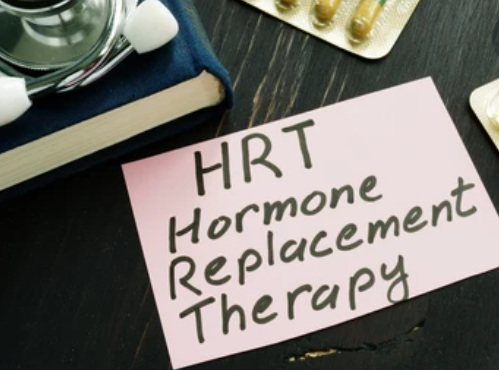What are the Side Effects from HRT



Hormone Replacement Therapy (HRT) is a treatment used to relieve symptoms of menopause. It supplements the female hormones that decrease during menopause. Oestrogen and progesterone are female hormones that trigger various physical and emotional symptoms, such as hot flashes, mood swings, and vaginal dryness. By restoring female hormone levels, HRT provides relief to many women. However, several concerns surround the usage of HRT, which you will find out as you read on.
One normal stage in a woman’s life is menopause. It marks the end of her reproductive cycle as the ovaries do not release eggs anymore, and she has her last menstrual cycle. A confirmed diagnosis of menopause becomes available when a woman has not had her menstruation for six to twelve consecutive months.
The term menopause refers to any changes a woman encounters either before or after she stops having menstruation. As this phenomenon nears, the ovaries slowly produce less oestrogen (a female hormone). It brings changes in the menstrual cycle, accompanied by other physical changes that characterize symptoms of menopause. These include hot flashes, night sweats, and changes in the vagina (i.e., dryness and thinning of the vaginal walls).
Menopause occurs naturally in women around ages 45 and 55. However, oestrogen levels can also decrease after the removal of the ovaries during surgery or if a woman goes through early menopause.
There are two general types of HRT, namely oestrogen-only HRT and combined HRT (oestrogen and progestogen). The former is for women with a surgically removed womb, while the latter is for those with an intact womb.
There are several ways that oestrogen can be taken, including:
Tablets or pills via oral administration. They are the most commonly used to treat menopausal symptoms. Among the many forms of pills available are conjugated oestrogens (Cenestin, Estrace, Femtrace, and Premarin) and oestrogens-bazedoxifene (Duavee). A doctor typically provides instructions for dosing oestrogen pills, which are often taken once daily without food. Some have more complex dosing schedules.
Oestrogen patch worn on the skin of the abdomen. They are replaced every few days or worn for a whole week, depending on the dose.
An implant under local anaesthetic
Topical oestrogen in the forms of creams (Estrasorb), gels (Estrogel or Divigel), and sprays (Evamist) applied in their respective area of skin, e.g., cream is applied on legs, and gel and spray on one arm
Vaginal oestrogen that comes in a cream (Estrace or Premarin), vaginal ring (Estring or Femring), or vaginal oestrogen tablets (Vagifem). It is generally used to alleviate vaginal dryness, itchiness, and pain during intercourse. Dosing schedules can vary from one product to another. Women may use creams daily or every other day; tablets everyday for some weeks, then only twice a week afterwards; and rings typically replaced every three months.
To protect the womb lining from being stimulated by oestrogen, progestogen is available as:
Combined with oestrogen tablets
Combined with oestrogen patches
Separately as tablets or a progestogen-releasing coil
To ease symptoms of menopause, many women resort to using HRT and find themselves enjoying the following benefits:
HRT increases the elasticity of the blood vessels.
HRT relieves hot flashes and night sweats within two weeks or even sooner.
HRT improves the quality of life by eradicating muscle aches and pains, improving mood and sleep hygiene, perking up libido, etc.
HRT improves vaginal dryness and itching.
HRT improves urinary symptoms, which means goodbye to the hassle of losing small amounts of urine when one sneezes, as is the frequent urge to empty the bladder.
HRT lowers the risk of fractures caused by osteoporosis (thinning bones).
HRT lowers the risk of cardiovascular disease.
HRT comes with miscellaneous benefits by having a protective effect against connective tissue loss. There may also be a decline in the risk of Alzheimer's disease and dementia in women who take HRT and a reduction in the risk of colorectal cancer with combined oral HRT.
Common aspirin and paracetamol are taken by multitudes to effectively eradicate common symptoms such as a headache.
But, some women experience an adverse, severe, and barely tolerable reaction to components of HRT, while others define the benefits of HRT to outweigh the impact of the side effects. Often, side effects, such as headaches, bloatedness or breast fullness, are temporary and resolve usually within a couple of weeks. Sometimes it is necessary to change the type of HRT to minimize side effects such as:
Breast tenderness
Headaches
Indigestion
Leg cramps
Nausea
Skin irritation
Vaginal bleeding
Acne
Bloating
Breast tenderness
Backache and pelvic pain
Depression
Fluid retention
Mood changes
Premenstrual syndrome-like symptoms
Vaginal bleeding
There are effective ways to minimize or even eradicate these side effects. For instance, taking the HRT tablet at night with food instead of in the morning can relieve nausea. It may also help to change from tablets to another type of HRT, like transdermal patches. And though proven false by research, some women will complain taking HRT has caused them to gain weight.

Taking only oestrogen without progestin while you still have your uterus is associated with an increased risk of endometrial cancer
Increased risk of breast cancer
Increase in inflammatory markers
Increased risk of blood clots and stroke
Increased risk of cardiovascular disease (including heart attack) and vascular disease (including venous thromboembolism)
All women taking hormone replacement therapy should have regular gynaecological exams (including a PAP smear), while women over the age of 50 should do the following:
Perform breast self-examination monthly
Visit her healthcare provide for an annual breast physical examination
Have a mammogram once a year
Although rare, HRT may slightly increase the risk of breast cancer. However, this does not lead to death due to HRT use. It's important to remember that this is a prevalent type of cancer. Regardless of HRT use, 1 in 8 women in the UK will develop breast cancer. Interestingly, the risk is actually lower in women treated with oestrogen alone.
It has been observed that a modest increase in risk may be associated with synthetic progestins in combined HRT. Therefore, using micronized natural progesterone may be a better option as it is not believed to stimulate breast tissue. Nevertheless, regular checking of breasts in addition to mammogram is important for monitoring. Lifestyle measures such as quitting smoking, reducing alcohol consumption, maintaining a BMI below 30, maintaining a proper diet and doing regular exercises, and meditation can help improve health and reduce cancer risk.
Dermal administration of HRT, such as via gel, cream, or patch form, does not increase the risk of clots. There may be a minor increase in the risk of thrombosis with oral or tablet formulation associated with high BMI (over 30). A high BMI alone already puts a person at a significantly increased risk of thrombosis, which needs prior resolution.
Most of the identified risks associated with HRT increase as the duration of use also increases. In other words, these risks are outweighed by the benefits of short-term use of HRT, exemplified by its effectiveness in alleviating menopausal symptoms of oestrogen deficiency.
While longer-term use of HRT is authorized only for the prevention of osteoporosis, doctors are responsible for informing patients of the increased risks of HRT use over time. Alternative preventative and therapeutic options for osteoporosis are also available and do not seem to entail the risks of treatment with oestrogen.
HRT is not advisable to prevent or treat any vascular disease; many strategies have been proven to reduce the risk of vascular problems, including aspirin and control of cholesterol levels and blood pressure. The decision to employ HRT should be discussed with each woman, considering her history, risk factors and personal preferences.
No. Women taking oral contraceptives also take oestrogen and progestin, but the effects are not the same. Women taking contraception pills are not yet in the menopausal stage and thus need higher levels of hormones to prevent ovulation. HRT is not as strong enough to stop ovulation. Oestrogen levels decrease in the post-menopausal period, and HRT is used at a low dose to return hormone levels to a more standard level.
Most women can stop HRT after menopausal symptoms are gone, usually 2 to 5 years after starting treatment (sometimes longer). In general, it is recommended to lower the HRT dose gradually rather than stopping it abruptly. Menopausal symptoms may return when HRT is discontinued, but these should resolve within a few months.
Visit your doctor if you have symptoms that carry on for some months after you stop having HRT. Treatment may have to be resumed, typically at a lower dose.
HRT may not be suitable for people who:
have a previous or current episode of breast, ovary, or uterus cancer
have a history of blood clots. HRT in tablet form is not advised, but dermal administration of HRT is considerable
have untreated high blood pressure
have a history of stroke or cardiovascular disease
have liver disease
are pregnant or breastfeeding
In these circumstances, your doctor may advise another treatment option to help manage your menopausal symptoms.
Setting an appointment for a doctor consultation will help you weigh the pros and cons. They are the best person to suggest options based on the severity of your symptoms and your medical history, and you can earn helpful and informed choices by asking the following questions:
Millions of women utilize hormone replacement therapy (HRT) to relieve menopausal symptoms, including hot flashes and sweating, for which oestrogen is uniquely and highly effective. Others may continue longer-term treatment hoping that HRT will help prevent chronic disease.
Clinical studies confirm the increased risks of breast cancer and thromboembolic disease, with evidence of an increased risk of stroke. Observational data suggest a slightly high risk of ovarian cancer may be associated with long-term use of HRT. The lack of evidence that other products are safer validates the claim that the benefits outweigh the risks associated with the long-term use of HRT.
To reiterate, the absolute incidence of adverse outcomes is low, and the risk to an individual woman is small, but small risks accumulate in the long run. Since most risks increase as the duration of use increases, her healthcare provider should regularly reassess a woman’s risks and benefits acquired from continued use of HRT.
We highly recommend for your further reading to click this link and learn more about hormone replacement therapy.
Plus get the inside scoop on our latest content and updates in our monthly newsletter.